International Journal of Cognitive Research in Science, Engineering and Education @ijcrsee
Статьи журнала - International Journal of Cognitive Research in Science, Engineering and Education
Все статьи: 494
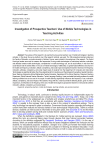
Investigation of prospective teachers’ use of mobile technologies in teaching activities
Статья научная
The purpose of this research is to examine the pre-service teachers’ use of mobile technologies in teaching activities. In this study, the survey method, one of the research methods, was used. The 199 prospective teachers studying at the Faculty of Education, a private university in Northern Cyprus, were included in the workgroup of the research. The 5-point Likert-type scales were used to measure the frequencies of using mobile technologies in instructional activities, motivation, and attitudes towards mobile technologies, competencies in mobile technology use, and its social effects. It was found that social factors had the lowest effect on the use of mobile technologies. Additionally, no gender-based difference was found in the mobile use frequency, motivation, attitude, competency, and social impact of prospective teachers. Moreover, the frequency, motivation, attitudes, competency, and social impact levels of students from the Department of Computer and Instructional Technologies are significantly higher than those departments from Guidance and Psychological Counselling, Special Education, Music Teaching, Elementary School Mathematics Teacher Education, Department of Pre-School Teaching, Classroom Teaching Department, Social Sciences Teacher Education, Turkish Language Teaching. It was concluded that having problems for mobile learning activities that can be used in the scope of mobile learning significantly influences the frequency of use, motivation, attitude, competency, and social impact of the students. Along with this, it was found that the following factors, given in order of importance, are influential on the frequency of the use of mobile technologies by prospective teachers in instructional activities: motivation, attitude, competency, and social impact.
Бесплатно
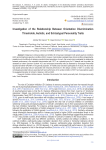
Статья научная
Imbalances in cortical excitation and inhibition (E-I) have been implicated in both autism spectrum conditions (ASC) and schizophrenia spectrum conditions (SSC). However, most studies investigate these clinical conditions independently, possibly due to the difficulty of obtaining comorbid clinical populations. As such, the current study investigated the relationship between performance in the orientation discrimination task “ODT” as a potential proxy for E-I balance and the autistic (as assessed by Autism Spectrum Quotient “AQ”) and schizotypal personality traits (as assessed by Schizotypal Personality Questionnaire-Brief “SPQ-BR”) in the general population. 87 healthy adult volunteers participated in the study. We found that high autistic personality traits are associated with enhanced performance in the oblique condition of ODT. In contrast, high schizotypal personality traits are associated with poor performance in the vertical condition of ODT. Such associations support the suggested disruption of cortical E-I balance in ASC and SSC.
Бесплатно
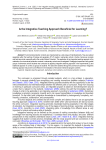
Is the integrative teaching approach beneficial for learning?
Статья научная
Environmental protection contents are characterized by a wide range of interdisciplinarity. They are realized separately within the teaching of biology and geography (5th-8th grade) in elementary school in Serbia. Numerous concepts and facts are similar, especially within the content Nature Protection. The application of an integrative teaching approach in the realization of environmental protection contents in elementary schools was investigated. Pedagogical experiment with parallel groups of elementary school students was conducted by applying integrative teaching approach in the experimental (E) and traditional approach in control (C) groups of students. The data were obtained through the pre-test and post-test. Integrative teaching approach has proven to be effective in the realization of the above-mentioned program contents.
Бесплатно
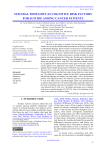
Статья обзорная
Since 1983, when Howard Gardner published his theory of multiple intelligences, educators have begun to incorporate this new model into school programs. However, the idea of multimodal teaching is hardly a new concept. Many pioneers of modern education, such as: J. J. Rousseau, J.H. Pestalozzi, M. Montessory, J. Dewey, suggested educational models that oppose uniformity and predominantly verbal teaching. The aim of the research presented in this paper is to identify and compare compatible elements of educational ideas of John Dewey and Howard Gardner. The research is based on historical-comparative method and content analysis technique and is focused on exploring three key elements of intersection: curriculum, methods of teaching and learning, and teachers’ role. Regarding the curriculum, both authors prefer integrated and thematic curriculum based on real-life context. They also agree on student-centred teaching where implementation of variety of active methods of learning will give opportunity to students to express their specific identity. Teacher’s role in both concepts is to link students’ personal experiences and characteristics to the material being studied and to the school life in general. The findings imply that educational implications of Gardner’s theory can be considered as a continuation of Dewey’s progressive vision of classroom teaching and school organization.
Бесплатно
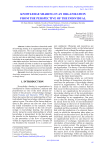
Knowledge sharing in an organization from the perspective of the individual
Статья обзорная
Authors introduce a theoretical model of knowledge sharing in an organization through individual perspective. The social exchange theory offers a clarification of fundamental assumptions regarding individual action and is therefore appropriate for explaining why and when an individual is ready to share her/his knowledge in an organization. The article aims to reveal what shapes employees’ decisions to share knowledge in a work situation and what is needed in an organization to facilitate individuals to share and not to hoard their knowledge. These assumptions have never been included in the literature of knowledge management up until now.
Бесплатно
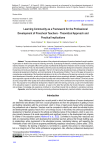
Статья научная
The paper addresses the importance of the professional development of preschool teachers through its positioning and action in relation to the concept of a learning community. By analyzing the literature, reviewing theoretical concepts and empirical research, the synergistic effect of the process of professional development of teachers and the concept of a learning community is determined. First of all, the benefits to which the process of professional development of teachers contributes within the learning community are determined, especially in the form of improving the educational process, professional competence and personal development of teachers, and most importantly, for the well-being of children. The aim of the paper is focused on a comprehensive understanding of the theoretical implications in the form of the influence of the learning community on the professional development of teachers, as well as the practical implications that are accordingly reflected in pedagogical practice. The above approach supports and affirms the principles of plurality and individual differences of each individual. Community is seen as a key concept within which quality and functional relationships are built, which contributes to the improvement of educational work. The proposal for the professional development of teachers within the learning community, as part of the transformation of the educational system in preschool education, is based on the belief that activities that include interaction, cooperation and exchange of knowledge and experiences contribute to more efficient results that are reflected in educational outcomes.
Бесплатно
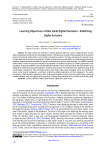
Learning Objectives in Older Adult Digital Education - Redefining Digital Inclusion
Статья научная
The article explores the redefinition of learning objectives within the context of digital education for older adults, addressing the critical need to enhance digital inclusion. It emphasizes the centrality of learning objectives as foundational elements in the design, implementation, and evaluation of educational programs. The study underscores the necessity of revising these objectives to promote the development of digital competences among older adults. As society becomes increasingly digitalized, traditional educational models must evolve to accommodate the dynamic digital landscape. The REMEDIS research initiative seeks to modernize educational frameworks and establish a more effective approach to cultivating digital skills in older populations. By employing SMART criteria and leveraging the expertise of senior and future trainers, the study identifies 12 key categories for contemporary educational objectives, including: basic computer and mobile device use, digital terminology, email communication, cybersecurity, online information retrieval, social media usage, instant messaging, culture and entertainment access, online financial management, e-commerce, smartphone software applications, and time management. The qualitative analysis of digital education objectives for older adults reveals a spectrum ranging from basic digital literacy to advanced e-service utilization, while also highlighting the importance of aligning these objectives with the practical needs of older adults.
Бесплатно
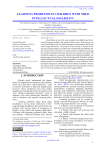
Learning problems in children with mild intellectual disability
Статья научная
School failure is one of the more complex, more difficult and unfortunately frequent problem that modern school meets. Many factors can cause school failure, such as: child development characteristics, family and school-originated factors. The purpose of the research is analysis of the specific learning problems in students with a mild intellectual disability. For our research we used ACADIA test, which contains 13 subtests for assessing the overall individual functioning. The research involved 144 students. We divided the sample into two groups, children with intellectual disability (our target group) and control group. We found that generally all students with the intellectual disability have special learning problems. According to individual subtests analysis we concluded that the ability for visual association is best developed among these students while on the subtest for auditory memory they achieved worse results. With the analysis of the control group we found that 13.75% of the students have special learning problems.
Бесплатно
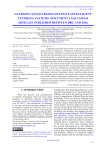
Статья научная
Actualizing instructional intercessions to suit learner contrasts has gotten extensive consideration. Among these individual contrast factors, the observational confirmation in regards to the academic benefit of learning styles has been addressed, yet the examination on the issue proceeds. Late improvements in web-based executions have driven researchers to re-examine the learning styles in adaptive tutoring frameworks. Adaptivity in intelligent tutoring systems is strongly influenced by the learning style of a learner. This study involved extensive document analysis of adaptive tutoring systems based on learning styles. Seventy-eight studies in literature from 2001 to 2016 were collected and classified under select parameters such as main focus, purpose, research types, methods, types and levels of participants, field/area of application, learner modelling, data gathering tools used and research findings. The current studies reveal that majority of the studies defined a framework or architecture of adaptive intelligent tutoring system (AITS) while others focused on impact of AITS on learner satisfaction and academic outcomes. Currents trends, gaps in literature and ications were discussed.
Бесплатно
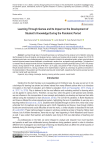
Статья научная
Learning through play in the teaching process is a technique that has received a lot of attention since play itself increases the focus of students, and develops memory, creativity, and creative skills in students. However, the COVID-19 pandemic period was a very challenging period for every character included in the educational system, where many techniques used with physical presence were evaporated, or transformed in another form, as played through gamification. The objective of our research was to analyze the level and form of implementation of games as a teaching technique during COVID-19 in primary schools, among teachers N=120, students N=80 from I do 5th grade, and parents N=100 in Kosovo and North Macedonia. Results showed that there is a strong correlation of the implementation of games as a technique by parents and teachers in the implementation of the pandemic and the students learning and mental health, respectively their learning success has risen and their mental health was improved.
Бесплатно
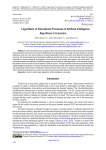
Legal Basis of Educational Processes of Artificial Intelligence Algorithms in E-tourism
Статья научная
E-tourism has become a key component in the tourism industry and allows travelers to easily access information about destinations and services via the Internet, facilitating their travel planning process. Through e-tourism, travelers can research destinations, plan trips, book accommodations, purchase transportation tickets, and explore tourist attractions through online resources. Also, this area helps tourism businesses to effectively promote their services, communicate with clients and manage reservations. E-tourism represents the integration of information and communication technologies in the tourism sector. This concept encompasses the application of digital technologies such as the Internet, mobile applications, online reservation systems, web platforms and social media to improve aspects of travel and tourism. The legal foundation of educational procedures utilizing artificial intelligence algorithms in e-tourism holds significant importance because of the multitude of potential legal complexities and obstacles that could emerge. The Republic of Serbia, like many other countries, is working on improving its regulations in order to enable the development of e-tourism and at the same time ensure the protection of the interests and safety of travelers.
Бесплатно
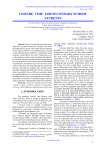
Leisure time for secondary school students
Отчет
Today, in education prevails the paradigm that is geared towards the complete and varied development of a person. This implies the development of the students ability for self-determination towards various other perspective offered by contemporary social residence. Meanwhile in the time of adolescence, the youth experience serious crises regarding their identity, in which the free time and the activities during the free time can be positively used with a cause to be interrupted unconstructive and chaotic use of the free time by the youth. In this thesis are being analyzed the contents and the ways with what the secondary school students in the Republic of Macedonia fulfill their free time outside the school, specifically there will be an examination about the gender differences i.e. the amount and manner of spending their free time. In the approach to the study of the problem of research, we decided to apply: inductive method, deductive method and the method of comparison.
Бесплатно
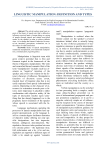
Linguistic manipulation: definition and types
Статья научная
The article touches upon basic aspects of the theory of speech acts that is defined as influence exercised upon a human being or a group of people through speech and related non-verbal means by the speaker in order to achieve definite aims, i.e. to change the listener's behavior, his mental set, intentions, perceptions, evaluations, etc. in the course of verbal interaction.
Бесплатно
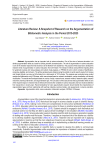
Статья научная
Argumentation has an important role in science education. One of the aims of science education is to develop argumentation skills as a basis for building scientific characterization. The role of argumentation in science education is one of the research topics that has received a lot of attention from academics. The purpose of this study was to analyze the research trend of argumentation in science education from 2015-2023. The research method used preferred reporting items for systematic reviews and meta-analyses and network meta-analyses, or PRISMA for short, which consists of identification, screening, eligibility, and inclusion. The articles analyzed were obtained using the publish or perish search engine from Scopus and Google Scholar, as many as 340 articles from a total search of 1013 articles. The analysis was conducted using content analysis and bibliometric using VOSviewer, which was reviewed based on network visualization, overlay visualization, and density visualization. The results were analyzed based on country of origin, research area, research method, research subject, research instrument, learning intervention, and argumentation type. The conclusion of this study shows that argumentation skills are one of the important topics in research that are linked with several other variables in science education and have received attention from researchers in recent years. Recommendations for future argumentation research should identify the characteristics of argumentation types and their relationship with teaching materials, learning models, and assessments in science education.
Бесплатно
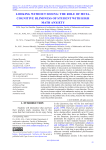
Looking without seeing: the role of metacognitive blindness of student with high math anxiety
Статья научная
This study aims to reveal how metacognitive failure occurs during problem-solving experienced by the pre-service teacher with mathematics anxiety. The data collected are in the form of words obtained through interviews, pictures of the results of the subject’s work, and the results of the mathematics anxiety questionnaire as an instrument for selecting subjects. Description of data analysis and interpretation of the meaning of the findings apply text analysis. Analysis is conducted in all phases of problem-solving including the phase of understanding, analyzing, exploring, planning, implementing, and verifying. The presence of metacognitive blindness is identified through red flag, which is a warning sign to stop or retreat to the previous problem-solving phase and immediately take certain actions. Three types of red flag identified in this study include lack of progress (LP), error detection (ED), and anomalous results (AR). The results of the analysis show that students who experience math anxiety can experience metacognitive blindness during the problem-solving process. Red flag, which is dominant in metacognitive blindness, is error detection. This red flag occurs because subjects with mathematics anxiety pay less attention to the details of the problem, so they miss a lot of important information. The subjects see the problem only on the surface, based on the words they read in the problem presented.
Бесплатно
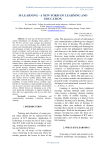
M-learning - a new form of learning and education
Статья научная
At each step, the Internet and information technologies are changing many aspects of life. We live; we buy, work, manage, and communicate new ways that technology has enabled. Information and communication technology are pervasive the technology of today. It finds application in every branch of industry, and in all areas of education and the basis for the successful operation of all social and state structures. Information and communication technology (ICT) provides a good foundation for creative and effective use of knowledge. Using mobile technology in education changes the basic view of learning when, where and how to learn. M-learning is a unique type of learning because students can access the lessons anytime, anywhere. Mobile learning is learning supported by mobile devices. It represents a new form of education. The notion of mobile learning covers a wide range of devices used for learning at any place at any time. These include various wired and wireless devices (mobile phones, PDA, iPod, Sony PSP, notebook devices...). M-learning offers the possibility of using mobile devices combine many benefits of e-learning in a single portable package that can be used at any time and anywhere using mobile devices. Mobile devices are emerging as one of the most promising technologies to support learning as they offer new opportunities that do not offer static devices.
Бесплатно
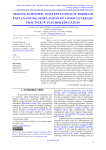
Статья научная
There is a current research interest into high-leverage teaching practices which are geared towards making concepts explicit to learners. Explanations are a common practice in science education for sharing and constructing meaning with students. However, current studies insufficiently articulate a framework for understanding pre-service teachers’ explanations; neither do they assess the practical criteria for development. This article documents various criteria for pre-service science teachers’ explanations as related to the cognitive science literature and their assessment in the context of an instrument designed for teacher education. A rubric was constructed which organized structural and supportive elements into three levels. A validation process is described, and its application in teacher education programs to detect possible patterns and changes in pre-service science teachers’ explanations. The results show the explanation strengths of pre-service teachers working with examples, graphs and images. However, difficulties were found in using and improving analogies, metaphors, and models, and also approaching mis-conceptions as a learning opportunity. Theoretical and practical issues are discussed from a cognitive perspective. We conclude that the signaling implications of using rubrics sensitive to progress-monitoring during teacher education for high-leverage teaching practices give opportunities to simulate and rehearse practices that are highly conducive to learning.
Бесплатно
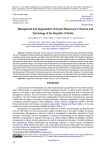
Management and Organization of Human Resources in Science and Technology of the Republic of Serbia
Статья научная
The subject of this paper is human resources in the field of science and technology in the Republic of Serbia. The aim is to establish the state and tendencies regarding the number and structure of human resources in the mentioned field. Accordingly, several research questions were defined. Open data (2018-2021) of the Statistical Office of the Republic of Serbia were used. The results showed that the average number of employees who have either higher education or are employed in the field of science and technology was 991.9 thousand and on average their number was growing. The majority were women, whose number and share increased on average. The average number of employees who have higher education and are employed in the field of science and technology was 501.4 thousand and their number was growing on average, including people of both genders. The majority were women, whose share was constant with a tendency to minimal decrease. The average number of employees aged 15-74 who are employed in the field of science and technology was 731.2 thousand and on average their number was growing, including persons of both genders. The majority were women, whose share was constant with a tendency to minimal increase. The most important sector in the field of science and technology was education. It is concluded that there are positive tendencies regarding the number of human resources in the field of science and technology in Serbia, especially when it comes to women.
Бесплатно
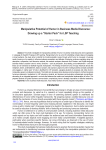
Статья научная
The article investigates the manipulative potential of humor in business media discourse and its application in Language for Specific Purposes (LSP) teaching. Recognizing humor as a tool for simplifying complex ideas and engaging a broad audience, the study aims to identify the functional-stylistic means through which humor is conveyed in business media, focusing on its capacity to influence audience perceptions and attitudes. Employing continuous sampling along with descriptive, comparative, and discursive methods, the research analyzes utterances from Russian- and English-language business media to explore humor’s various functions – such as persuasion, focus-setting, and entertainment – and how these can be harnessed to facilitate linguistic manipulation. The findings reveal that humor, through rhetorical devices like metaphors, idioms, understatement, allusion, sarcasm, and oxymoron, plays a key role in making business concepts accessible and engaging. A “starter pack” of tools is identified for LSP education, equipping students to recognize and utilize humor’s manipulative power in professional contexts. This toolkit aims to prepare future business communicators to craft and recognize humorous statements. Implications for LSP educators, students, and business communication professionals are significant, advocating for an integrated approach in curricula that balances the creative and manipulative implementation of humor. This prepares students for global business communication, emphasizing humor’s strategic importance in effective leadership.
Бесплатно
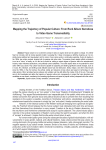
Mapping the trajectory of popular culture: from rock album narratives to video game transmediality
Статья обзорная
Popular culture is not a coherent concept; it lacks an organic whole and is subject to change. It is neither fixed nor concrete, with its modus operandi rooted in everyday life. It does not possess a definitive meaning, as it is constantly being redefined and reevaluated, and the canon of pop culture works is continually expanding. During its heyday in the 1960s, pop culture evolved, shaping both its passive and active roles. The passive (mass) aspect reflects a tendency to act as a “mirror” of reality, as it is and as it should be, adding a certain degree of glamour within the entertainment industry, major Hollywood productions, and politically correct celebrities. The active aspect relies on the potential for social action within pop culture. Pop culture has become capable of supporting and leading significant cultural changes, such as in music, film, literature, and shifting social attitudes toward war and destruction, family, religion, and other critical issues since the 1960s. In the 21st century, the activity, vitality, and relevance of pop culture are based on technology, AI, and video gaming. Other narratives become allusive and outdated, yet they still define the modes of life of the era. This paper aims to first investigate and define the trajectory of popular culture and, consequently, to project the future directions and modalities we can expect, considering the increasing significance and impact of popular culture juxtaposed with elite culture.
Бесплатно

